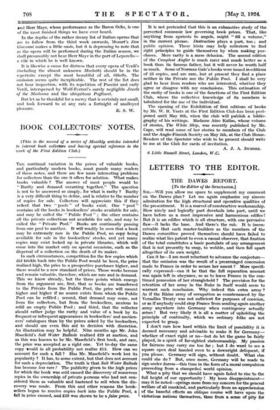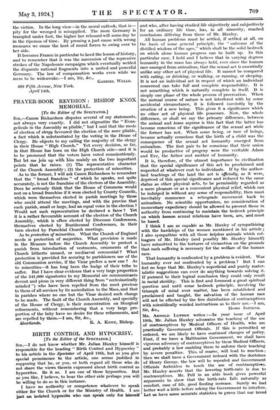LETTERS TO THE EDITOR.
THE DAWES REPORT.
[To the Editor of the SPEcreaou.]
Sie,—Will you allow me space to supplement my comment on the Dawes plan? Let me again emphasize my sincere admiration for The high structural and operative qualities of the presentment. It is a marvel of constructive workmanship. How nicely and logically part dovetails into part, -until we have before us a most impressive and harmonious edifice ! But it is an edifice which is all structure, with one pervasive flaw—it lacks the base. And there's the rub.- It is incon- ceivable that such master-builders as the members of the Dawes committee proved themselves should have failed to realize what lies patent to even a casual observer, that fixation of the total constitutes a basic postulate of any arrangement that is not presently to snap, to wobble, and then fall apart altogether of its own weight.
Can it be—I am most reluctant to 'advance the conjecture— that the omission was the result of a prearranged concession made to France in order to secure her assent ? More specifi- cally expressed—can it be that the full reparation amount was again left in abeyance, so as to leave France in the con- tinued possession of her stranglehold ? The proviSion for the retention of her army in the Ruhr in itself would seem to warrant such conclusion. Why indeed this extra army ? As if the Rhine army of occupation as countenanced by the Versailles Treaty was not sufficient for purposes of coercion, or as if anybody could stop France from sending again another army anywhere into Germany when contingency actually arises But very likely it is all a matter of upholding the principle of continuity, which we ordinary folks are not expected to grasp.
I don't care how hard within the limit of possibility it is deemed necessary and advisable to make it for Germany— whether of exact right or no—but do let the game be fairly played, in a spirit of far-sighted statesmanship. My passion for fairness may carry me too far ; but I do want to see a square open deal handed even to a downright deliquent, if you please. Germany will sign, without doubt. What else could she do ? But, once more, Germany will be made to sign under duress—this time in the form of a moral compulsion proceeding from a stampeded world opinion.
What a pity that we should have again failed to rise to the full height of our opportunity ! My keen disappointment— may it be noted—springs more from my concern for the general welfare of all mankind, and particularly from an apprehension of the baneful effects an oblique course will have upon the victorious nations themselves, than from a sense of pity for the victim. In the long view—in the moral outlook, that is— pity for the wronged is misapplied. The more Germany is trampled under foot, the higher her rebound will some day be in the ripeness of time. By pressing a just cause with wrong measures we cause the host of moral forces to swing over to her side.
It becomes France in particular to heed the lesson of history, and to remember that it was the succession of the repressive strokes of the Napoleonic campaigns which eventually welded the disparate national fragments into a united and powerful Germany. The law of compensation works even while we seem to be wideawake.—I am, Sir, &c.,
GABRIEL WELLS.
489 Fifth Avenue, New York.
April 14th.















































 Previous page
Previous page